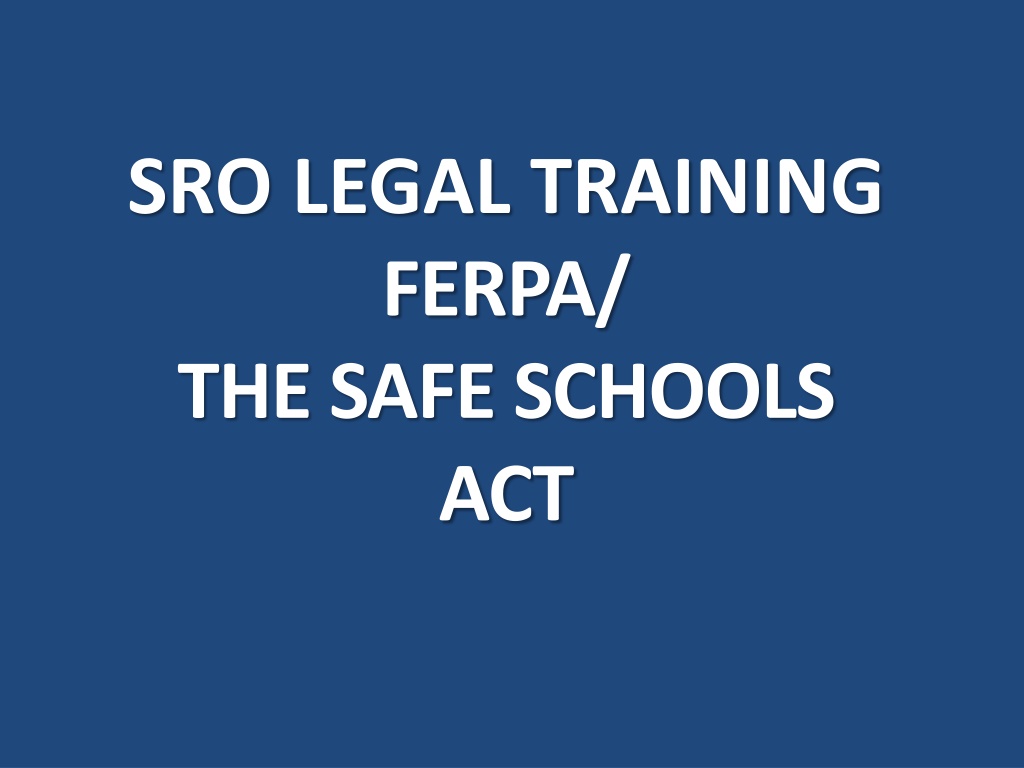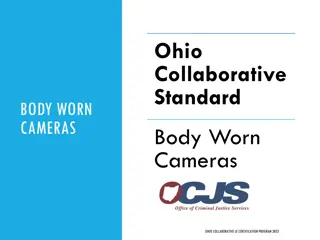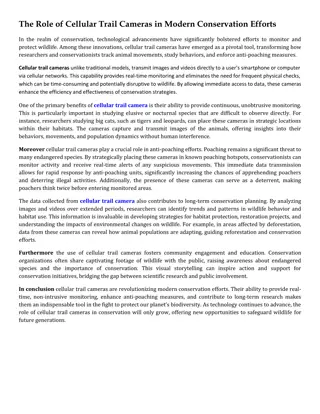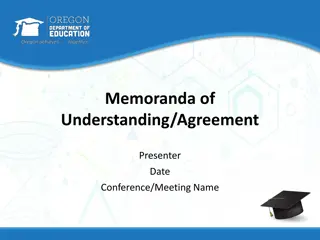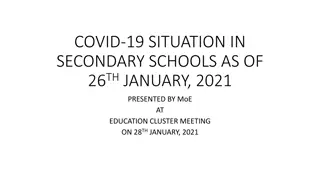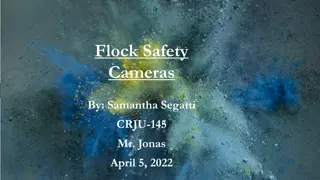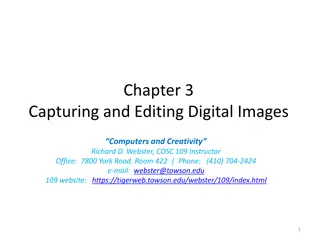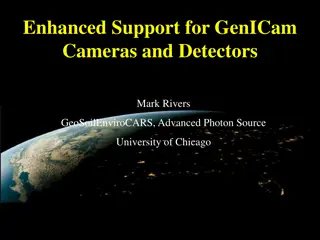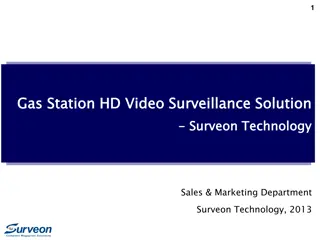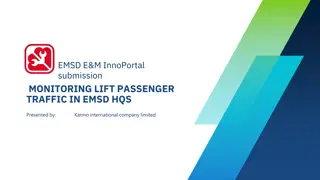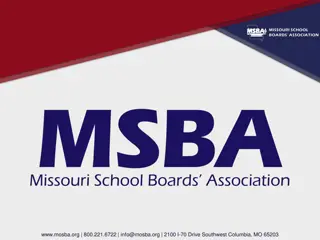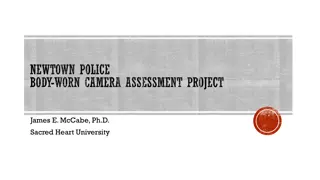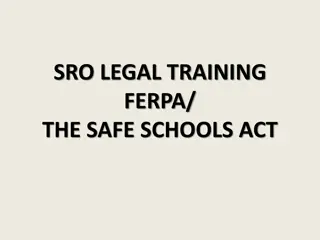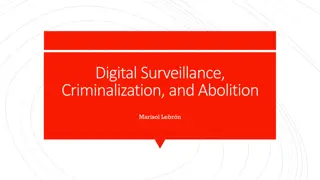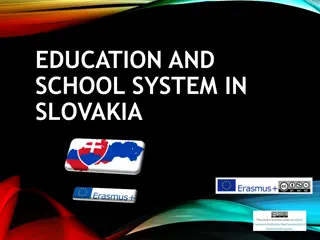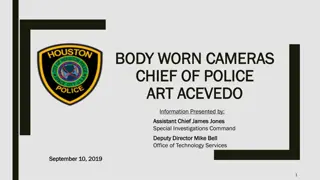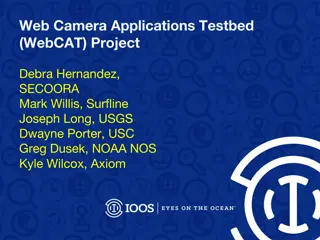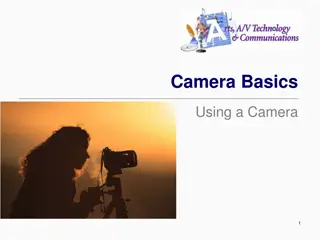Effective Implementation of Body Cameras and MOUs in Schools
Explore the guidelines and recommendations for using body cameras in schools, particularly focusing on the ownership of recordings by local law enforcement agencies, proper usage by School Resource Officers (SROs), and the role of Memorandums of Understanding (MOUs) in ensuring transparency and accountability.
Download Presentation

Please find below an Image/Link to download the presentation.
The content on the website is provided AS IS for your information and personal use only. It may not be sold, licensed, or shared on other websites without obtaining consent from the author. Download presentation by click this link. If you encounter any issues during the download, it is possible that the publisher has removed the file from their server.
E N D
Presentation Transcript
SRO LEGAL TRAINING FERPA/ THE SAFE SCHOOLS ACT
SCOTT SUMMERS DIRECTOR OF SCHOOL LAWS MISSOURI SCHOOL BOARDS ASSOCIATION summers@mosba.org 1.800.221.6722
AGENDA NEW LAWS FERPA SAFE SCHOOLS ACT CASES QUESTIONS!!
NEW (and kind of new) LAWS
BODY CAMERAS A recording taken by a LE mobile video recorder (body/vehicle camera) that is taken in a non- public location (dwelling, school, medical facility) may be a closed record Upon written request, the following may receive unaltered, unedited copy Person depicted in recording Person/voice in the recording Legal guardian/parent if minor Atty for depicted person Family member if deceased
RECOMMENDATIONS Designate SRO as Law Enforcement Unit Body camera footage taken at the school is the property of local law enforcement agency Created and maintained in accordance with local law enforcement agency policies and procedures Request copies of local law enforcement agency policies/procedures MOU with local law enforcement agency
MOUS Make it clear that camera recordings are the property of local law enforcement agency Require local LE agency to provide advance notice to the district before officers assigned to the district begin using the body cameras Require SROs to use body cams only when performing LE duties and in accordance with state law and the provisions of the local LE agency s body camera program
MOUS Require SRO s to receive training on the program including the proper use and operation of the cameras Include language about district s access to the recordings Local LE agency will if not otherwise prohibited by law provide copies of the footage to the district upon district request If providing a copy is prohibited, LE will facilitate the availability of its officer that made the video to testify, upon district request, in any school disciplinary hearing concerning the facts and circumstances surrounding the videoed incident If camera footage is provided to a 3rdparty (media, parents) LE will provide a copy to district upon request
UNLAWFUL USE OF WEAPONS 571.030.1 A crime to knowingly (10) carry a firearm, whether loaded or unloaded, or any other weapon readily capable of lethal use into any school, onto any school bus, or onto the premises of any function or activity sponsored or sanctioned by school officials or the school board. 571.030.4 Subsection (10) shall not apply to any person who has a valid concealed carry permit
UNLAWFUL USE OF A WEAPON 571.030 Consequence (weapon on district property with NO conceal/carry permit) A Misdemeanor Unloaded E Felony - Loaded
CONCEAL/CARRY LAWS 571.107.1 No concealed carry permit or endorsement shall authorize a person to carry concealed firearms into . . . (10) Any elementary or secondary school facility without the consent of the governing body/school official/school board Unless authorized as SPO
CONCEAL/CARRY LAWS 571.107.2 Consequences Carrying a concealed firearm in an elementary/ secondary school facility by a person holding a valid c/c permit or endorsement shall not be a criminal act, but may subject the person to denial to the premises or removal from the premises
CONCEAL/CARRY LAWS 571.215 States the same requirements as 571.107 Applies to those persons who have a lifetime or extended c/c permit
PARKING LOTS 571.107, .205 Possession of a firearm in a vehicle on the premises of any elementary or secondary school facility shall not be a criminal offense so long as the firearm is not removed from the vehicle or brandished while the vehicle is on the premises.
ALL TOGETHER NOW 571.030 - It is a crime of unlawful use of a weapon if a person comes onto district property with a weapon with no valid c/c permit or endorsement It is NOT a crime of unlawful use of a weapon if the person has a valid c/c permit/endorsement
ALL TOGETHER NOW 571.107 - IF a person has a valid c/c endorsement or permit they are prohibited from carrying the firearm/weapon onto any elementary or secondary school facility UNLESS The school officials/board have authorized it
ALL TOGETHER NOW C/C Consequences IF the person has a valid c/c permit/endsmt. AND the person brings a firearm into the district facility AND the district does NOT allow weapons in the facility THEN it s not a crime, But the person may be barred or asked to leave (trespassing) Subject to fine and permit restrictions
ALL TOGETHER NOW The district is permitted to pass a policy that prohibits weapons/firearms on school property and in school facilities (MSBA Policy ECA/KK) Also may prohibit weapons in vehicles while on district property If weapon is in a vehicle it s NOT a crime District may ban/prohibit person from district property
JUVENILE DEFINED SB 793/800 (211.031 RSMo) Doesn t go into effect until 2020 Changes the definition of adult in the juvenile law from 17 to 18 years of age and older Child is person under the age of 17
NEW LEGISLATION HB 1606 If a district teaches a course in human sexuality the district must teach students about sexual harassment, sexual violence, and consent HB 1355 Driver s training courses must include instruction on actions to be taken during traffic stops and appropriate interactions with law enforcement. Students will also receive information regarding the dangers of operating a motor vehicle while intoxicate or on drugs
NEW LEGISLATION SB 1007 Prohibits public employers (school districts) from disciplining or terminating an employee, volunteer, intern, or other person working in the district for discussing the operations of the district with the legislature, state auditor, attorney general, prosecuting attorney, law enforcement, news/media, state investigative body, or the public Prohibits districts from disciplining employees for the disclosure of any activity that is a violation of the law, mismanagement, gross waste of funds, abuse of authority, violation of policy, waste of public resources, alteration of technical findings, breaches of professional ethics, or a substantial danger to health or safety, if the disclosure is not prohibited by law
SB 1007 (cont.) Prohibits the district from requiring an employee to give notice prior to disclosing information or preventing the employee from testifying before a court, administrative body, or legislative body Requires the district (employer) to post notice of the statute where all employees may view it
NEW LEGISLATION HB 1355 State law prohibits certain sex offenders from living within 1,000 feet of a school building. This law clarifies how the distance will be measured SB 655, 819 Removes time limits for prosecution of sex offenses in which the victim is under 18 Creates a tiered sex offender registry program where a person must register between 15 years and life, depending on the severity of the offense and where an offender can request removal from the registry in certain circumstances
NEW LEGISLATION SB 843 Creates a task force of state agencies, school personnel, and advocates to make policy recommendations for reducing child sexual abuse, including school curriculum, school personnel training, educational information for parents, and support for students to be successful in school SB 819 Creates a committee to create guidance to assist in the identification of children who have experienced trauma and implement trauma-informed approaches in schools and other settings
FAMILY EDUCATIONAL AND PRIVACY RIGHTS ACT FERPA
WHAT IS IT? Federal law protecting student educational records A parent has a right to access, seek to amend and have some control over the disclosure of personally identifiable information from the student s educational records
GENERAL RULE Student education records cannot be released without the written consent of a parent/ guardian or eligible student Unless an exception applies Or there is a court order
WHO IS A PARENT? Biological parent, guardian, individual acting as a parent in the absence of the parent/guardian Eligible student reached age of 18 or attending a post-secondary institution
WHAT IS AN EDUCATION RECORD? Records that are Directly related to a student Maintained by an educational agency or institution Or a party acting for or on behalf of the agency institution May include biometric records (DNA, fingerprints, etc.)
EDUCATION RECORDS Do NOT include Information obtained by direct observation or received orally Records kept in the sole possession of the maker to use as a memory aid Records maintained by a law enforcement unit of the district Personnel records of the district Information collected about student now alum
PERSONALLY IDENTIFIABLE INFORMATION Information that alone, or in combination, is linked or linkable to a specific student that would allow a reasonable person in the school community who has no personal knowledge of the relevant circumstances to identify the student with reasonable certainty EX name, mother s maiden name, address, DOB, SSN, parent s name
DIRECTORY INFORMATION Most common FERPA exception Personally identifiable information (PII) that is not generally considered harmful or an invasion of privacy if it is disclosed NO student ID or SSN MAY include student ID if on badge District decides what, if anything, to include/not include as directory info (Policy JO)
DIRECTORY INFORMATION Districts must notify parents annually and allow parents to opt out If parents don t opt out, then district is able to disclose without the need for prior written consent The district is able to limit who directory info will be provided to or may limit info only be provided for specific reasons Regardless district may still require student to disclose name, identifier, or institutional email
COMMON EXAMPLES Grade level Date/place of birth Parent name, address, contact info Awards/honors Coursework displayed by district Photos, videotapes, digital images, recorded sound Etc ??
DIRECTORY INFORMATION Biggest exception Directory Information School MUST designate what is directory info Policy JO (MSBA) Subpoena/Court Order/Warrant Easiest way for outside entities to get records! But LE agencies don t like to do this Meet with them and discuss what FERPA is and why they need one
FERPA AND LAW ENFORCEMENT
WHAT WOULD YOU DO? Law enforcement entities in your community are investigating an assault that occurred on your school campus during the school day. Officers have requested you to provide a class list containing the names and addresses of all students who were in the classroom for the particular period when the assault occurred. Can you give it to them?
WHAT WOULD YOU DO? Frankie, age 15, is arrested for shoplifting. It s his first offense. Police department contacts you and wants information on Frankie s attendance, discipline referrals, grades. Can you give this information to them?
WHAT WOULD YOU DO? Macy and Allison get into a fight while on campus. You, the SRO, break up the fight. You file an incident report with the assistant principal. You give the AP the report AND you keep a copy of the report for your own records. Later, that weekend, Macy and Allison are taken into custody for continuing their fight at the local mall. Police department knows you were involved with the incident at school and ask you for a copy of your incident report. Can you give them a copy?
WHAT WOULD YOU DO? You are employed by your local police department and have been assigned, with an MOU, to work at a local school district as an SRO. You are investigating an current student s involvement in an incident of vandalism at the school and on district property. You request the student s education records, including his home address, phone number, attendance records, and grades from the school counselor. You want to use this information for disciplinary proceedings with the school and also seek restitution for damages. You have a video of the incident which shows the student damaging the property.
THE BASICS Law enforcement agencies unconnected to district have no FERPA authority to receive student education records No automatic exception to law enforcement to receive records from school May receive if consent or other exception applies
THE BASICS Remember Schools cannot disclose an education record without prior parental consent (or 18 year old student) But School MAY disclose the education record to a school official with a legitimate education interest/purpose So what is a school official?
SOWHATS A SCHOOL OFFICIAL? Includes a teacher, school principal, board president, chancellor, board member, trustee, registrar, counselor, admissions officer, attorney, accountant, human resources professional, information systems specialist, support/clerical personnel Contractor, volunteer, or other party to whom school has outsourced institutional services or functions if performing a service or function the school would otherwise use employees to perform AND The party is under the direct control of the agency or institution with the respect to use and maintenance of education records Could be a School Resource Officer
SCHOOL OFFICIAL In certain cases, SRO s may be considered a school official with legitimate educational interest Is under the direct control of the agency or institution with respect to use and maintenance of education records (would apply if SRO is employed directly by district!) But, SRO is subject to the requirement that PII from the education record may ONLY be used for the purpose the disclosure was made to the SRO school/student safety, physical security
SCHOOL OFFICIAL Also must meet the criteria specified in the school district s annual notification of FERPA rights for being a school official with a legitimate educational interest Legitimate educational interest if official needs to review an education record in order to fulfill his or her professional responsibility Notification means that parents now that SROs have access to children s educational records
SCHOOL OFFICIAL SRO wants to view a student s educational records First question is why for what purpose? School Law Enforcement If for LE you don t get them unless you re a school official But then must show you have legitimate educational interest in getting them
SCHOOL OFFICIAL So Any records shared with SRO cannot be re- disclosed to other law enforcement agencies Usually this is why the SRO wants the records Need to have a frank conversation with law enforcement agencies/prosecutor about this and tell them why you are not able to provide these records
SCHOOL OFFICIAL Discipline (Example) Yes, discipline is legitimate educational purpose But is SRO really involved in the school discipline (we advise not to be!) Not involved no Legit Educational Purpose What if you are also the Law Enforcement Unit as well as the school official? Need to review student statements maintained as an educational record to determine if student committed a criminal act on campus Yes! SRO gets records BUT Can t re-disclose to outside LE agency (unless consent or exception applies!!)
LAW ENFORCEMENT UNIT Under FERPA, law enforcement unit records may be used and/or disclosed without penalty.
LAW ENFORCEMENT UNIT What is a LEU? Any individual, office, department, division, or other component of an educational agency or institution, such as a unit of commissioned police officers or non- commissioned security guards, that is officially authorized or designated by that agency to Enforce any local, State, Federal law, or refer to appropriate authorities a matter for law enforcement of any local, State or Federal law against any individual or organization other than the agency or institution itself, OR Maintain the physical security and safety of the agency or institution
